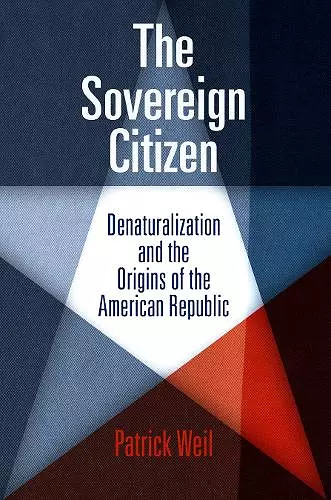The Sovereign Citizen
Denaturalization and the Origins of the American Republic
Format:Paperback
Publisher:University of Pennsylvania Press
Published:23rd Nov '12
Currently unavailable, and unfortunately no date known when it will be back

Present-day Americans may feel secure in their citizenship, but there was a time when citizens could be denationalized. Patrick Weil examines the twentieth-century legal procedures, causes, and enforcement of denaturalization to illuminate an important and neglected dimension of American citizenship, sovereignty, and federal authority.
Present-day Americans feel secure in their citizenship: they are free to speak up for any cause, oppose their government, marry a person of any background, and live where they choose—at home or abroad. Denaturalization and denationalization are more often associated with twentieth-century authoritarian regimes. But there was a time when American-born and naturalized foreign-born individuals in the United States could be deprived of their citizenship and its associated rights. Patrick Weil examines the twentieth-century legal procedures, causes, and enforcement of denaturalization to illuminate an important but neglected dimension of Americans' understanding of sovereignty and federal authority: a citizen is defined, in part, by the parameters that could be used to revoke that same citizenship.
The Sovereign Citizen begins with the Naturalization Act of 1906, which was intended to prevent realization of citizenship through fraudulent or illegal means. Denaturalization—a process provided for by one clause of the act—became the main instrument for the transfer of naturalization authority from states and local courts to the federal government. Alongside the federalization of naturalization, a conditionality of citizenship emerged: for the first half of the twentieth century, naturalized individuals could be stripped of their citizenship not only for fraud but also for affiliations with activities or organizations that were perceived as un-American. (Emma Goldman's case was the first and perhaps best-known denaturalization on political grounds, in 1909.) By midcentury the Supreme Court was fiercely debating cases and challenged the constitutionality of denaturalization and denationalization. This internal battle lasted almost thirty years. The Warren Court's eventual decision to uphold the sovereignty of the citizen—not the state—secures our national order to this day. Weil's account of this transformation, and the political battles fought by its advocates and critics, reshapes our understanding of American citizenship.
"An important, exhaustive, and meticulously researched work" * Dissent *
"In vividly depicting the long struggle to secure the citizenship rights of Americans, Weil treats us to striking insights as well as delicious tidbits of newly discovered data." * Norman Dorsen, former President of the American Civil Liberties Union *
"One of the world's leading experts on nationality brilliantly explores past campaigns to strip Americans of their citizenship. Patrick Weil reveals how both bureaucratic rigor and national security zeal threatened citizenship rights, and points to important lessons for twenty-first century debates." * Gerald Neuman, Harvard Law School *
"In this masterful and timely book, Patrick Weil plunges deep into rarely used archives to write a new history of the shaping of American identity in the twentieth century, all the more important as we now debate the reform of immigration law. This story of belonging and exile has its heroes-defenders of civil liberties who deserve to be better known-and its scoundrels. Unlike many histories, it has a heartening conclusion." * Linda K. Kerber, author of No Constitutional Right to Be Ladies: Women and the Obligations of Citizenship *
ISBN: 9780812222128
Dimensions: unknown
Weight: unknown
296 pages